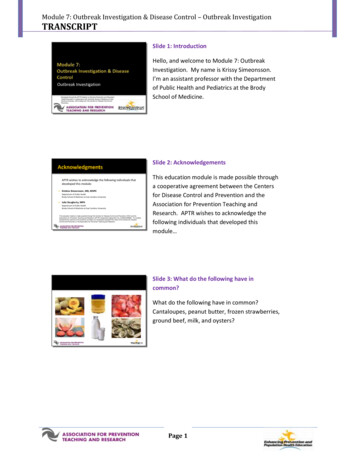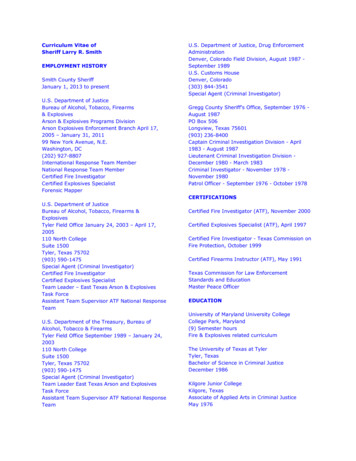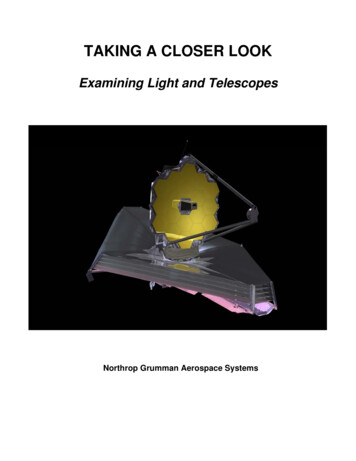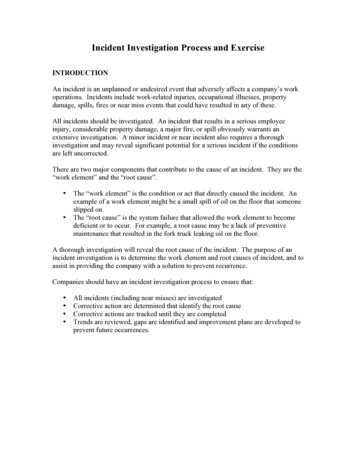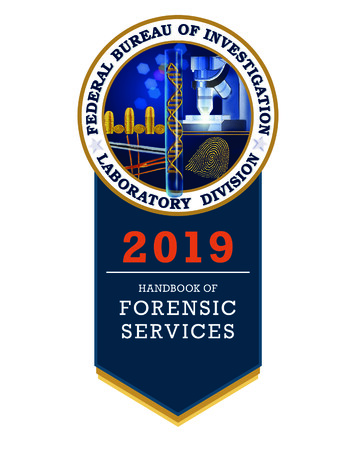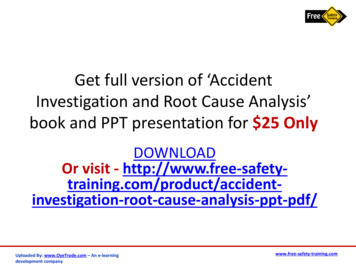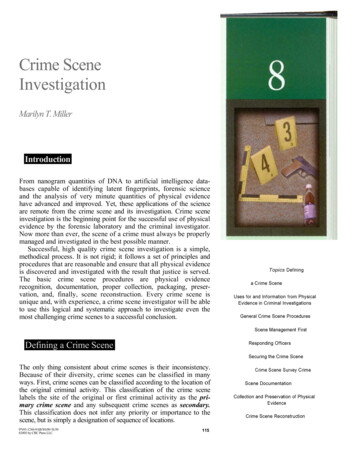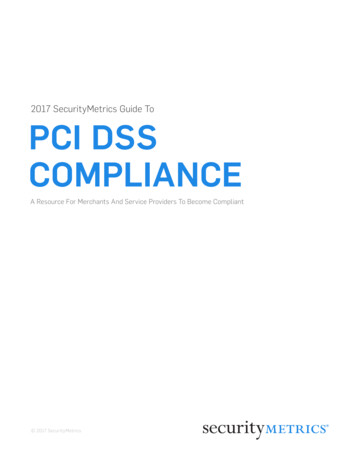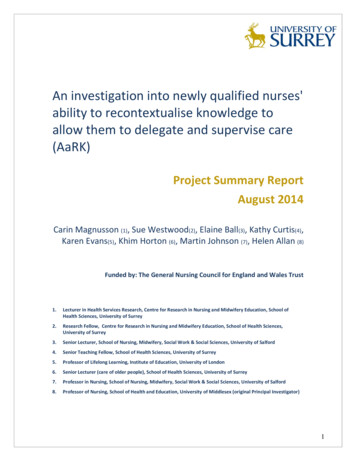
Transcription
An investigation into newly qualified nurses'ability to recontextualise knowledge toallow them to delegate and supervise care(AaRK)Project Summary ReportAugust 2014Carin Magnusson (1), Sue Westwood(2), Elaine Ball(3), Kathy Curtis(4),Karen Evans(5), Khim Horton (6), Martin Johnson (7), Helen Allan (8)Funded by: The General Nursing Council for England and Wales Trust1.Lecturer in Health Services Research, Centre for Research in Nursing and Midwifery Education, School ofHealth Sciences, University of Surrey2.Research Fellow, Centre for Research in Nursing and Midwifery Education, School of Health Sciences,University of Surrey3.Senior Lecturer, School of Nursing, Midwifery, Social Work & Social Sciences, University of Salford4.Senior Teaching Fellow, School of Health Sciences, University of Surrey5.Professor of Lifelong Learning, Institute of Education, University of London6.Senior Lecturer (care of older people), School of Health Sciences, University of Surrey7.Professor in Nursing, School of Nursing, Midwifery, Social Work & Social Sciences, University of Salford8.Professor of Nursing, School of Health and Education, University of Middlesex (original Principal Investigator)1
ContentsContents . 2Acknowledgements . 4Executive Summary . 51. Introduction . 62. Background . 63.2.1.Social policy context . 62.2.Research context . 62.3.Theoretical context: Recontextualisation and liminality . 82.4.Research rationale . 8Methodology . 93.1.NQN’s Recontextualised Knowledge . 93.1.1. Research aims . 93.1.2. Research objectives . 93.1.3. Data collection . 93.1.4. Data analysis . 93.2.Pilot of Preceptorship tool . 93.2.1. Research aims . 103.2.2. Research objectives: tool development . 103.2.3. Intervention procedure . 103.2.4 Data collection . 103.2.5. Data analysis . 104.Findings . 114.1.NQN’s Recontextualised Knowledge . 114.1.1. Organisational learning contexts . 114.1.2. Delegation in context. 114.1.3. Learning processes . 115.4.2.Degree vs diploma pathways . 144.3.Preceptorship tool . 14Conclusion. 15References . 18Appendix One: Data Collection . 20Appendix Two: Preceptorship Tool . 22Appendix Three: Outline of project conceptual framework . 23Appendix Four: Outputs and dissemination. 242
ForewordThe Francis report highlighted the importance of proper support and supervision forhealth care assistants (HCAs), to ensure they are not just ‘left to their own devices’,potentially exposing patients to unacceptable risks1. The report also indicated a need formore effective delegation by nurses in relation to HCAs. However, despite the increasingrelevance of delegation and supervision skills among nurses, these do not form a centralcomponent of nurse training or preceptorship programmes. Newly qualified nurses(NQNs) often feel they can be left to ‘sink or swim’ as they make the transition fromstudent to fully operational qualified nurse. This transitional period is not yet wellunderstood and yet it is a vital stage in the qualified nurse’s journey. A central elementof it involves being able to delegate and supervise bedside care.Therefore this research is timely and breaks new ground in several key ways. Firstly,using ethnographic methods, including direct observation, and drawing on a substantialdataset, it tracks the processes involved in NQNs’ initial months of transition fromstudent status. Secondly it identifies the pressures and challenges, frustrations andsuccesses, and learning processes which are involved. Finally, it highlights the systemiccontexts in which this transition takes place, and which ward and/or organizationalcultures are most likely to facilitate this process.This report focuses in particular on how NQNs develop their delegation and supervisionskills, helping to explain the transitional processes and reporting on the piloting of a toolwhich may support these processes. The pilot study offers rich insights into how NQNsrespond to the challenges of delegation and supervision, and which learning stylesrespond best to use of the tool. The study also highlights the importance of supportingnurses in developing reflective practice skills.With increasing pressures on NHS resources, there is going to be ever more reliance onstreamlining tasks and roles between nurses and healthcare support workers.Maximising clinical microsystem performance via effective working between them, andin particular, appropriate task allocation and completion respectively, will form a crucialcomponent in safe and efficient patient care and outcomes. As such this report is auseful addition to the literature, offering insights into how effective working can bemaximised, in order to optimise use of resources as well as minimising potential failuresof care and promoting the optimum patient experience.Professor Fiona Ross, August 2014Director of Research, Leadership Foundation for Higher Education1Francis R (chair) (2013) Report of the Mid Staffordshire NHS Foundation Trust Public Inquiry.The Stationery Office.3
AcknowledgementsThe project team would like to thank the following people for making this projectpossible: The advisory board members for their support, advice and guidance. All the research participants at the three Hospital Trusts, who gave their timeand shared their experiences and views so generously. The Educational Leads and Directors or Nursing in the Hospital Trusts whofacilitated access and recruitment of research participants. This study would nothave been possible without their active support. Penny Robinson for the excellent administrative support and participantrecruitment. We gratefully acknowledge the financial support from The General NursingCouncil for England and Wales Trust.Carin Magnusson on behalf of the projectteam:Helen AllanElaine BallKathy CurtisKaren EvansKhim HortonMartin JohnsonSue WestwoodAugust 20144
Executive SummaryDelegation of care by nurses, patient safetyand quality of care are unequivocally linked.Failures in delegation can create fertileground for errors. Delegation has beenproven to be particularly challenging fornewly qualified nurses, leading toperformance problems associated with timemanagement,inadequateworkloaddistribution, insufficient supervision ofdelegatedtasks,withassociatedimplications for clinical productivity.This report describes key findings from theAark project which involved: a) Aninvestigation into newly qualified nurses'(NQNs) ability to recontextualise knowledgeto allow them to deliver, organise andsupervise care; b) A pilot evaluation of anewly developed delegation tool aimed atsupporting newly qualified nurses in theorganisation, delegation and supervision ofbedside care.The first phase of the study involved:observations of newly qualified nurses; andsemi-structured interviews with NQNs,health care assistants (HCAs) and wardmanagers, which sought to understandNQNs transition from student to fullyoperational qualified nurse. From the firstphase of our study, we identified that NQNsneed support during the transition fromstudent to fully operational qualified nursein the following areas: developingconfidence; understanding role ion skills; setting care priorities;achieving successful care outcomes. Thisinformed the second phase of our study,which involved the piloting of a tooldesigned to support nurse development inthese areas. In the pilot study the nurseswho made good use of the tooldemonstrated learning by reflection andhow that learning process in turn supportedrecontexualisation of knowledge.Our research highlighted the significance ofthe changing roles and worlds of nursing forrecontextualisation in the development ofskills relating to the prioritisation,delegation and supervision of care bynurses. The nursing curriculum preparesnurses only partially for the many demandsofsupervision,delegationandaccountability in the modern staff nurserole. There is a need for increased focus onlearning and support in this important area.How NQNs delegate to HCAs, and how theylearn to supervise HCAs in carrying outthose delegated tasks, also tend to be fairlyad hoc and contingent upon ward culturesand staff teams. This suggests the need formorestructurededucational/trainingsupport in development of the necessaryskills. This may be in academic, practice orpreceptorship contexts and might alsoinvolve simulated scenarios.Our research suggests that NQNsrecontextualise theoretical knowledge inthe workplace to emerge as competent andsafe nurses. We suggest that this processoccurs in a liminal space with three phases,pre-liminal (separation), liminal (transition)and post liminal (reincorporation). Thisliminal space is where recontextualisationtakes place. There are support functionswithin the NHS to both recognise andsupport this liminal journey, most notablypreceptorship courses but also informally insupport shown by clinical colleaguestowards the NQNs. Both sources of formaland informal support are highly variableacross wards and hospitals.The delegation tool may support thisprocess of recontextualisation. The toolmay be optimised by ensuring that there issufficient organisational space for reflectionand that nurses are encouraged tounderstand the importance of e.5
1. IntroductionThis summary report presents thebackground, study design and key findingsfrom the Aark project which aimed to:a) Investigate newly qualified nurses' abilityto recontextualise knowledge to allow themto deliver, organise and supervise care,including consideration as to whether thisdiffers between degree- and diplomaqualified nurses; andb) Carry out a pilot evaluation of apreceptorship delegation tool developedduring this project aimed at supportingnewly qualified nurses in the organisation,delegation and supervision of bedside care.tasked the Department of Health (DH) andthe nursing and midwifery profession withimplementing the nursing leadershipagenda through policies such as: Modernising Nursing Careers (DH 2006)which aims to develop careers to retainhighly skilled nurses in the workforce;The Nursing and Midwifery Council’s(NMC) review of pre-registrationnursing education with the aim tointroduce all undergraduate preregistration programmes by 2011 (NMC2009);The Prime Minister’s Commission (DH2009) which is charged with developinga template and vision for the future ofnursing and midwifery.The knowledge from this study willcontribute to ensuring the safe andprofessional delegation and supervision ofbedside care, and examine the knowledgethat nurses need, in evolving andcontemporary academic and healthcarecontexts.At the heart of these policy strands (DH2006; 2009; NMC 2009) is the aspirationfor:2. Background This section describes the background tothe project in terms of: Social policy context;Research context;Theoretical context; andResearch rationale.2.1. Social policy contextAs a result of the economic downturn andto help meet expected financial targets,NHS trusts require more from their nursingworkforce. Nursing is a profession for whichdemand is predicted to increase due to anageing population and more peoplesuffering from long-term, manageableconditions (Shin 2006; Worrell 2007).The UK Government has made it clear thatnurses will increasingly take up leadershippositions in order to meet these challengesin future healthcare. The Government has Compassionate, skilled care combinedwith a sense of service;Nurses who respond to patients’ rses who are prepared to leadchanges within health services.2.2. Research contextNurses are increasingly delegating tasks tounregistered health care staff due to risinghealthcare costs, the need to maximiseresources, skills-mixes, and the generalexpansion of health workers’ roles(Standing & Anthony 2008; Sikma andYoung 2001; Weydt, 2010; Gillen & Graffin,2010). There is a greater interest indelegation in the United States of America(USA) which may be attributable to astronger focus on accountability, legalauthority and litigation in the USA (Standingand Anthony, 2008, Sikma and Young,2001).In the USA, each state has its own legaldefinition regarding delegation. By contrast,6
in the UK there is no legal definition ofdelegation (Cipriano, 2010). However theUnited Kingdom’s Nursing and MidwiferyCouncil’s Code of Conduct (NMC, 2010)states that nurses and midwives must:establish that anyone being delegated to isable to carry out instructions; confirm thatoutcomes of tasks meet the requiredstandards; and can ensure that delegateesare supervised and supported. The NMCalso offers separate guidance which advisesnurses and midwives to consider thefollowing in relation to delegation (NMC2012): the needs of the people in their care;the stability of the people being cared for;the complexity of the delegated task; theexpected outcome of the delegated task;the availability of resources to meet thoseneeds; and the judgment of the nurse ormidwife.Delegation is defined as the “transfer ofresponsibility for the performance of anactivity from one individual to anotherwhile retaining accountability for theoutcome” (ANA, 1997: 4). The term isclosely related to other concepts, such asresponsibility, accountability and authority(Weydt, 2010). Cipriano (2010) maintainsthat delegation is an underdeveloped skillamong nurses which is difficult to assess asit relies on personality, communication styleand mutual respect between the registerednurse and the healthcare assistant.Munn, Tufanaru, and Aromataris (2013),propose that there is a lack of clarity aboutthe role of healthcare assistantscomplicates delegation processes. Bradley(2013) in a recent large-scale UK survey,reported that many HCAs feel unsupportedin their roles. It has been highlighted thatdelegation skills are not evaluated in thesame way as other clinical skills; this asproblematic because of delegation’s stronginfluence on clinical and financial outcomes(Weydt, 2010).Several authors suggest that nursesurgently need to improve their delegationskills (Curtis & Nicholl, 2004), and that:one of the most complex nursingskills is that of delegation .requir[ing] sophisticated clinicaljudgement and final accountabilityfor patient care (Weydt, 2010).Despite this, it has been suggested that“nurse education does not prepare studentsfor the practicalities of this role” (Hasson,McKenna and Keeney 2013: 231).Improvement of delegation may requiretraining and confidence-building atdifferent stages as the newly qualified nursematures. Multiple, multimodal, teachingstrategies may need to be utilised tosupport this process (Josephsen 2013). Theconsequence of poor or unsafe delegationis serious as it can lead to poor patientoutcomes and concern for patient safety(Francis 2013; Standing and Anthony 2008).According to Anthony and Vidal (2010),delegation, patient safety and quality ofcare are unequivocally linked and canprovide fertile ground for errors. Althoughdelegation was not highlighted in the MidStaffordshire Report (Francis 2013), clinicalleadership was, and delegation is linkedinextricably to the flawed leadership whichwas highlighted by the Inquiry.Research on delegation has tended to besmall scale and focused largely on theattitudes and experiences of the RegisteredNurses (RNs). For example, Sikma andYoung (2001) explored what it was like tobe involved in nurse delegation. Thefindings demonstrated that RNs enjoyed thefreedom of delegating as it allowed them touse professional judgement, develop newmodels of care, set boundaries and, inessence, define their own practice.However, the authors acknowledged thatthere were risks, such as the liability forcare performed by others and a lack ofresources for training and supervision.Standing and Anthony (2008) interviewed7
acute care nurses in the USA to examine thenature and significance of delegation. Theirfindings suggested that many nursesconceptualised delegation as the tasks thatgo on outside of the ward routine, and apositive working relationship was seen askey to successful delegation. According toAnthony and Vidal (2010), the issue ofinadequate delegation in clinical practice isstill poorly understood, as are the processesof supervision of HCAs.Delegation has been proven to beparticularly challenging for NQNs (Gillenand Graffin 2010; O’Kane 2012) but isunder-addressed in pre- and postqualifying nurse education (Hasson,McKenna, & Keeney 2013; Whitehead,Owen, et al 2013). This can lead toperformance problems associated with timemanagement (Curtis and Nicholl 2004),inadequate workload distribution andinsufficient supervision of delegated tasks,with associated implications for clinicalproductivity, patient safety (Mohr andBatalden 2002) and the patient careexperience (Cipriano 2010).Central to the introduction of all graduateentry to nursing in the UK is the aspirationto educate to graduate level whilemaintaining care at the heart of nursing.However there can be a belief that being agraduate nurse precludes a caring attitude(Joel 2002). Attitudes to an all-graduatenursing profession vary in England despiteits introduction in Wales and Scotland andinternationally (Clinton et al 2004; Shin2006). Additional concerns include: The need for the existing nursingworkforce to adapt to an all graduatenursing profession and the curriculumchanges in the new undergraduate preregistration programmes;The need to ensure the safe andprofessional delegation and supervisionof bedside care to health care assistants(HCAs), when graduate nurses nolonger provide as much direct hands-oncare.We do not yet know what effects the moveto an all graduate profession in England willmake on patient care or what measures wehave in place to assess the possible futureeffects of an all graduate profession.2.3. Theoretical context:Recontextualisation and liminalityThe work of Evans et al. (2010) proposesthat knowledge in practice-based disciplinesis not merely transferred from theory topractice but recontextualised in differentpractice settings. This insight is useful forpractice disciplines where theoreticalknowledge is not always directlytransferable to practice (Allan, Smith &O'Driscoll M (2011). In this project we drawupon the concept of liminality. This wasoriginally used to conceptualise lifetransitions. It has been expanded by Allanet al to understand the Recontextualisationprocesses involved as NQNs stand at thethreshold of their transition from studentnurse to registered nurse (Allan et elsubm.).Recontextualisation and liminality are bothuseful theoretical frameworks to examinenurse learning in practice, as they offer away of understanding the uncertain,exploratory, changing nature of learning asa newly qualified professional in the worldof work/clinical practice. They are also auseful way to encourage a learningorganisational approach to .2.4. Research rationaleLittle is known about the experiences ofnewly qualified nurses and how they learnto delegate and supervise health careassistants’work.Improvingnursedelegation and supervision, particularlyamong newly qualified nurses as they adjustto their new role, will maximise thecoordination of bedside care and ensure8
safe, effective and efficient patientoutcomes (Weydt 2010). Devising apreceptorship toolkit has the potential tosupport the development of NQNsdelegation and supervision skills to improvepatient outcomes. It will also provideevidence to support and enhance training(Allan, Smith & Lorentzon 2008), improvethe patient experience and contributetowards safer, more cost-effective care(Steven et al 2014). Understanding theeffects of academic award on registerednurses’ ability to recontextualise knowledgeto allow them to deliver, organise andsupervisecare,willinformthedevelopment, delivery and effectiveness ofnurse training and practice.3. MethodologyThis section describes the researchmethodologies used in two aspects of theresearch project: the study of NQNs’recontextualised knowledge and thepiloting of a preceptorship tool.3.1. NQN’s Recontextualised Knowledge3.1.1. Research aimsThe primary research aim was tounderstand how newly qualified nurses(NQNs) use the knowledge learnt inuniversity to allow them to organise,delegate and supervise care on the wardswhen working with and supervisinghealthcare assistants. A secondary researchaim was to determine whether there was adifference between degree or diplomaqualified nurses in their delegation andsupervision of bedside care.3.1.2. Research objectives Observe and describe the organisation,delegation and supervision of nursingcare by newly qualified nurses to HCAs;Explore how newly qualified nursesrecontextualise knowledge to allowthem to organise, delegate andsupervise nursing care. Ascertain whether there are differencesbetween degree and diploma qualifiednurses in terms of the way they are ableto organise and delegate care3.1.3. Data collectionThree ethnographic case studies (Burawoy1994) were undertaken in three hospitalsites, using mixed methods including:1. Participant observations: n 230 hours;2. Interviews with NQNs: n 28;3. Interviews with Healthcare Assistants:n 10;4. Interviews with Ward Managers: n 10.Observational research is acknowledged tobe an effective way of learning about whathappens in the clinical workplace (Pope,Van Royen and Baker 2002). See AppendixOne for full details of data collection fromthe three hospital sites, and for profiles ofeach hospital site.3.1.4. Data analysisData were analysed using thematic analysisaided by the qualitative software NVivo.Summary findings are presented in SectionFour.3.2. Pilot of Preceptorship toolDrawing on the findings from phase one, anevidence-based preceptorship tool fororganizing, delegating and supervising carewas developed focusing on the specificareas where NQNs needed support. Thetool was designed to be in addition to otherlearning,teachingandassessmentapproaches used within the local HospitalNQN preceptorship programme.The tool (see Appendix Two) comprises sixareas for reflexive and supportiveconversations relating to organizing,delegating and supervising care of patients:9
1. Confidence2. Role Boundaries3. Knowledge4. Communication5. Care Priorities6. Care OutcomesEach area contains trigger questions todirect and support reflective processes andconversations. The tool has been producedin two formats (pocket-sized booklet, A4sheet) so that the NQN can select theformat best suited to that individual andorganisational context.The pilot aims and objectives, as well asevaluation methodology, are describedbelow.3.2.1. Research aimsThe aim of the pilot was to evaluate theusefulness of the tool in supporting NQNs’development of skills in organizing,delegating and supervising HCAs in theprovision of bedside care.3.2.2. Research objectives: ent of the tool are as follows: Describe the use of the tool by newlyqualified nurses;Explore how newly qualified nurses usethe tool;Explore reasons for non-use of thetool;Identify ways in which the tool mightbe refined and/or improved;Identify organisational contexts whichbest promote effective use of the tool.with an explanation of the tool and itspurpose by one of the research teammembers, and was given the tool in achoice of formats (A4 and/or booklet). Itwas envisaged that use of the tool would besupported within preceptorship meetings.The aim was that through use of this tool aspart of reflective practice, the NQN wouldfind the tool useful in a) developing,organizing, delegating and supervisingknowledge and skills that are meaningfulbased upon their own experiences and b) inrecognizing their own strengths and areasfor further development. This would in turnexpose the NQNs to opportunities toidentifystrategiesforimprovedperformance that would positively impactupon the quality of patient care provision.After three months NQNs were iews, to explore their experiences ofusing the tool and individual NQN’spersonal development in organizing,delegating and supervising bedside care.3.2.4 Data collectionData were collected via telephoneinterviews with the NQNs who had beengiven the pilot tool. Out of the originalparticipants, thirteen were interviewed.Reasons for non-interview of the remainingincluded: left the hospital Trust; on longterm sick leave; on maternity leave;unavailable; withdrew from study (oneindividual).3.2.5. Data analysisData were analysed using qualitativemethodology and simple quantitative(statistical) analysis. The findings aredescribed in Section Four.3.2.3. Intervention procedureAn initial three month pilot (October 2013to January 2014) of the preceptorship toolwas conducted with NQNs recruited fromthe three hospital sites. Each was provided10
organisations, such as social services,the police or care homes.4. FindingsThis section summarises the findings fromthe respective data sets and analyses asoutlined in Section Three.4.1. NQNs’ Recontextualised KnowledgeThe findings are presented according to theproject conceptual framework for NQNs’knowledgerecontexualisation(seeAppendix Three). This framework involvesthree inter-related areas of development:1. Organisational learning contexts: thecontext within which NQNs develop,recontextualiseandusetheirknowledge.2. Delegation in context: how the NQNssupervise and delegate care to HCAsand how the role boundaries arenegotiated between NQNs and HCAs.3. Learning processes: NQN knowledgedevelopment ‘in action’ and factors thatsupport/hinder learning.4.1.1. Organisational learning contextsEach ward and each hospital organisationhas its own unique set-up and culture andthis was found to have a strong influence onhow the NQNs were able to recontextualisetheir knowledge.The care contexts within which nurses workevery day were found to have a stronginfluence on how the NQNs learn. Inparticular, NQNs spent considerable time: Documenting care and assuringaccountability;Reassuring relatives;Being repeatedly interrupted and facingcompeting priorities;Completing discharges;Being ‘held up’ due to having to wait formedication from pharmacy, late testresults or trying to get hold of otherWard managers commented on theconstantly changing nursing environment,and the pressures on both themselves andon NQNs in this context. Healthcareassistants and NQNs observed how muchtime NQNs were required to spend on thecomputer, and how this in turn lef
Senior Lecturer, School of Nursing, Midwifery, Social Work & Social Sciences, University of Salford 4. Senior Teaching Fellow, School of Health Sciences, University of Surrey 5. Professor of Lifelong Learning, Institute of Education, University of London . contemporary academic and healthcare contexts. 2. Background This section describes the .
